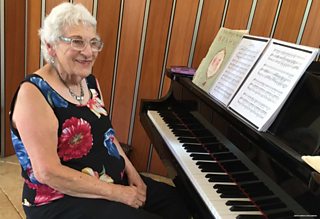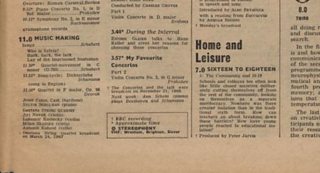An Accompanist's Tale

Sylvia Schulman has worked as a concert pianist and accompanist since the 1940s
In a career spanning eight decades, pianist Sylvia Schulman has worked as a concert pianist and played in live and recorded broadcasts for networks across the world. She recalls her experiences of accompanying renowned singers for broadcasts on �������� Radio 3 50 years ago.
Sylvia Schulman was born in Southern Rhodesia (now Zimbabwe) in 1925. A talented pianist, she studied at the South Africa College of Music, and moved to the UK in 1963 where she stayed for 15 years. It was here that she collaborated with singers John Carol Case and Norman Bailey (whom she had first accompanied in 1955) – and became part of the with broadcasts on Radio 3 in the 1960s and 1970s.
"I was doing concerts with John Carol Case all over England," she says. "He was very well known for his English song singing. He had done his own English translation of Schumann’s Dichterliebe, which he wanted to broadcast. The �������� wasn’t keen though,” says Sylvia, "because they regarded it as correct only to broadcast it in its original German. They finally agreed. It is an excellent translation."

Norman Bailey, singer and collaborator with Sylvia
No room for error
Sylvia’s previous work as an accompanist and her experience in broadcasting led to her being booked for numerous programmes. , appositely, was accompanying John Carol Case in a repertoire which included Schubert’s "Who is Sylvia?" She remembers coming to record at Broadcasting House. "It was a very pleasant experience. We always did a sound check first to ensure the microphones were in the right place, then we would do the programme. I always listened afterwards and recorded them."
Programmes were recorded in one take and there was no room for any error. Sylvia already had experience recording live for SABC in South Africa, so she didn’t find the experience nerve-wracking. "In those days, everything was recorded 'live', so you got used to it!"
Another collaborator was opera singer Norman Bailey, whose rich bass-baritone had first impressed Sylvia when she accompanied him at a concert in South Africa in 1955. Born in Birmingham, Bailey had emigrated to South Africa, but also collaborated regularly with Sylvia in London. Together they performed works by Wagner, Schubert and Beethoven for Radio 3.
Beyond her piano recordings, Sylvia was a regular visitor to Broadcasting House as part of a musical duo with her friend, cellist Pamela Hind O’Malley. They received coaching there from contacts in the ��������’s Music Department, one of whom was the well-known musicologist .

Sylvia's first credit was in Radio 3's "Music Making" on 5 January 1968 - including the appropriate Schubert song "Who is Sylvia?"
The "Piotr Zak" hoax
It was during one of these visits that Keller shared the story about an unusual programme he had produced for Radio 3's predecessor, the Third Programme, in 1961.
Sylvia recalls: "He and [pianist colleague] Susan Bradshaw (known for playing the 'modern' music of ) had various instruments placed around the recording studio, and they just went round the room playing the odd few notes or banging the drum until they had the semblance of a piece of 'music' Then they made up the name of the 'new composer' and played the recording."
In a in August 1961, Keller invited two critics who had responded to the work, to discuss this broadcasting 'curiosity' and what is said about modern-day music composition. Keller defended the broadcast as a way of finding out how far such a piece of 'music' would be taken seriously by the music world, with a discussion teasing out the difference between a 'bad work' and a 'non-work'. "I believe writers were really taken in by the hoax!" says Sylvia.
Now 94, Sylvia Schulman is still giving concerts – the most recent in March this year was a repertoire of Brahms with the US baritone Brad Liebl, with whom she has worked many times over the years. "I played two solos and all the accompaniments!"